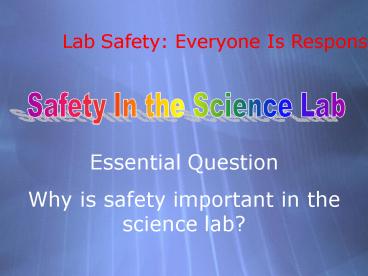Safety In the Science Lab - PowerPoint PPT Presentation
1 / 15
Title:
Safety In the Science Lab
Description:
... horseplay, practical jokes, pranks, etc. Follow all instructions ... Take care that hair, clothing and hands are a safe distance from the flame at all times. ... – PowerPoint PPT presentation
Number of Views:91
Avg rating:3.0/5.0
Title: Safety In the Science Lab
1
Lab Safety Everyone Is Responsible!
Safety In the Science Lab
Essential Question Why is safety important in the
science lab?
2
General Safety Guidelines
- Be Responsible at All Times. No horseplay,
practical jokes, pranks, etc.
- Follow all instructions carefully.
- Do not play with lab equipment until instructed
to do so.
- Food, drink, and gum are not allowed in the
science classroom.
3
General Safety Guidelines
- Notify the teacher immediately of any accidents
or unsafe conditions in the science classroom!
- Wash your hands with soap and water after
experiments.
- Never do anything in the laboratory that is not
called for in the laboratory procedures or by
your instructor.
4
General Safety Guidelines
- Read all procedures thoroughly before entering
the laboratory.
- Bring only your laboratory instructions,
worksheets, and/or reports to the work area.
Other materials (books, purses, backpacks, etc.)
should be stored in the classroom area.
- Know the locations and operating procedures of
all safety equipment including the first aid kit,
eyewash station, safety shower, fire
extinguisher, and fire blanket. Know where the
fire alarm and the exits are located.
5
General Safety Guidelines
- Dispose of all chemical waste properly. Never mix
chemicals in sink drains. Do not use the sink as
a trash can.
- Keep hands away from face, eyes, mouth and body
while using chemicals or preserved specimens.
- Wash your hands with soap and water after
performing all experiments
- Clean off your lab table when finished with 10
clorox. - Return equipment to the correct storage place.
6
General Safety Guidelines
- Experiments must be personally monitored at all
times. You will be assigned a laboratory station
at which to work. Do not wander around the room,
distract other students, or interfere with the
laboratory experiments of others.
- Students are never permitted in the science
storage rooms or preparation areas unless given
specific permission by their instructor.
- Any time chemicals, heat, or glassware are used,
students will wear laboratory goggles.
7
General Safety Guidelines
- Experiments must be personally monitored at all
times. You will be assigned a laboratory station
at which to work. Do not wander around the room,
distract other students, or interfere with the
laboratory experiments of others.
- Students are never permitted in the science
storage rooms or preparation areas unless given
specific permission by their instructor.
- Any time chemicals, heat, or glassware are used,
students will wear laboratory goggles.
8
Using Chemicals
- Check the label on chemical bottles twice before
removing any of the contents. Take only as much
chemical as you need.
- Never return unused chemicals to their original
containers.
- Acids must be handled with extreme care. You will
be shown the proper method for diluting strong
acids. Always add acid to water, swirl or stir
the solution and be careful of the heat produced,
particularly with sulfuric acid.
9
Using Chemicals
- Never remove chemicals or other materials from
the laboratory area.
- Never look directly into a test tube or
container.
- Hold test tubes away from you and other students.
10
Handling Glassware andEquipment
- Never handle broken glass with your bare hands.
Use a brush and dustpan to clean up broken glass.
Place broken or waste glassware in the designated
glass disposal container.
- When removing an electrical plug from its socket,
grasp the plug, not the electrical cord. Hands
must be completely dry before touching an
electrical switch, plug, or outlet.
- Examine glassware before each use. Never use
chipped or cracked glassware. Never use dirty
glassware.
- Do not immerse hot glassware in cold water it
may shatter
11
Heating Substances
- Exercise extreme caution when using a gas burner.
Take care that hair, clothing and hands are a
safe distance from the flame at all times. Do not
put any substance into the flame unless
specifically instructed to do so. Never reach
over an exposed flame. Light gas (or alcohol)
burners only as instructed by the teacher.
- Never leave a lit burner unattended. Never leave
anything that is being heated or is visibly
reacting unattended. Always turn the burner or
hot plate off when not in use.
12
Heating Substances
- Do not point the open end of a test tube being
heated at yourself or anyone else.
- Heated metals and glass remain very hot for a
long time. They should be set aside to cool and
picked up with caution. Use tongs or
heat-protective gloves if necessary.
13
Whats Wrong With This Picture?
14
Whats Wrong With These Statements?
- Hal says that his teacher is solely responsible
for preventing laboratory accidents. - Keshia started the lab activity before reading it
through completely. - Ricardo decided to do a lab activity that he read
about in a library book before the teacher came
into the classroom. - Stephanie says that the safety goggles mess up
her hair and give her raccoon eyes. She refuses
to wear them. - Barbie and Ken accidentally break a beaker full
of some chemical. Instead of risking getting in
trouble they quickly clean up the mess with paper
towel and throw it in the garbage.
15
Any Questions?
- REMEMBER
- Carefully read through the entire safety
contract and sign. - Have your parents read and sign your safety
contract. - Study for the safety quiz next week!































